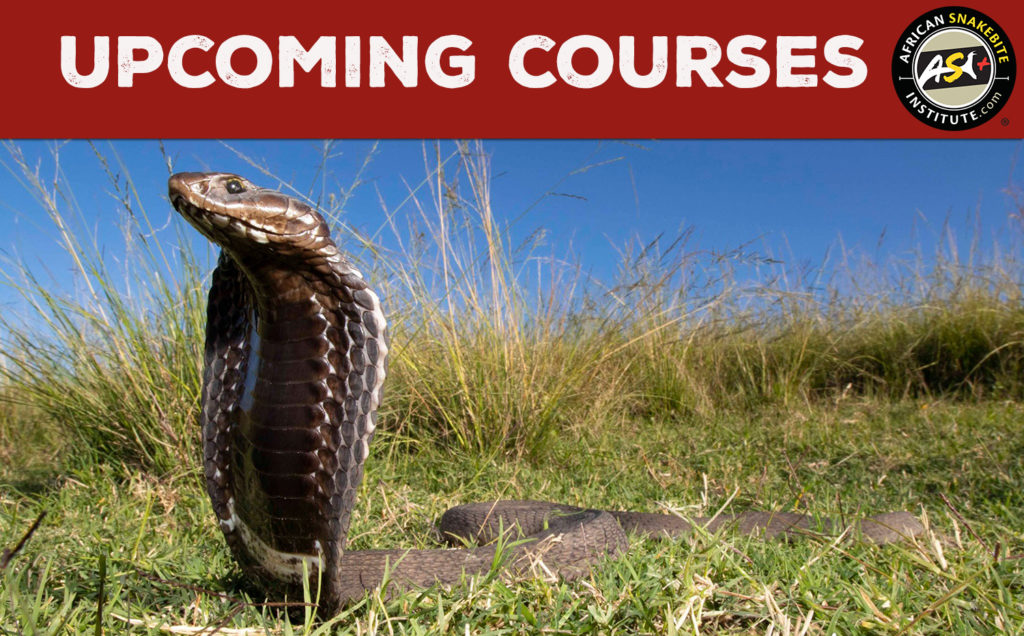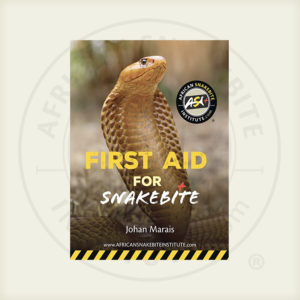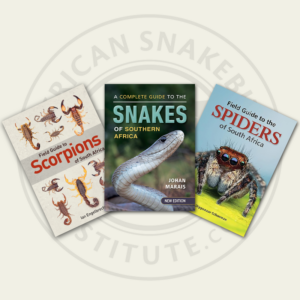Want to attend the course but can’t make it on this date?
Fill in your details below and we’ll notify you when we next present a course in this area:

African Snakebite Institute – Gauteng Snake Courses
Snakes in Gauteng: What You Need to Know
Gauteng is home to a rich variety of snake species, naturally occurring across diverse habitats — from the grassy vleis and open fields around Johannesburg to the bushveld regions surrounding Pretoria. Due to the province’s urban sprawl and extensive development, many snake encounters occur in residential gardens, homes, or on business premises.
There are seven highly venomous snake species in Gauteng, including two spitting species — the Rinkhals and Mozambique Spitting Cobra. While most snakes prefer to avoid human contact, their presence in densely populated areas is inevitable. Thankfully, bites remain rare given the number of people living in the province.
Unfortunately, dogs often fall victim when they attack snakes that stray into yards or homes. In many cases, dogs are bitten or spat in the eyes during these confrontations. (For more information on protecting your pets from snakes, click here.)
Whenever possible, snakes should be safely and humanely removed without harm. The ASI Snakes app is a widely used resource that lists vetted local snake removers by area — making it easy to find help quickly.
For those keen to take a more active role, the African Snakebite Institute (ASI) offers expert-led snake handling courses designed to empower you to respond safely in snake-related situations. These courses also enable you to assist others with snake removals — contributing to snake conservation across southern Africa.
As Africa’s leading provider of snake awareness, first aid for snakebite, and venomous snake handling training, ASI offers courses to both corporate clients and the general public at venues throughout South Africa.
Our comprehensive course range includes:
Snake Awareness, First Aid for Snakebite & Venomous Snake Handling (Level 1)
Snake Handling Bootcamp (Level 2)
These courses are open to everyone — from outdoor adventurers like hikers, trail runners, birders, campers, hunters, and fishermen, to property owners, farmers, and anyone with a passion for snakes or a desire to be better prepared for encounters.
Snake Awareness, First Aid for Snakebite and Venomous Snake Handling (Level 1 course)
Our Snake Awareness, First Aid for Snakebite and Venomous Snake Handling Course is our most popular course. It kicks off with a morning session during which we discuss scorpion sting, spider bite and then covers snake awareness, first aid for snakebite as well as snake behaviour and biology, myths and superstition, identifying snakes and how doctors treat snakebite. Delegates can choose to do the theory session only. During the handling session, delegates are taught safe protocols for catching and releasing venomous snakes using the correct equipment. Delegates do not make physical contact with venomous snakes.
Snake Handling Bootcamp (Level 2 course)
The next course in the range is our Snake Handling Bootcamp. This is a hands-on day of practical snake handling. Delegates are taken through the basics of catching and releasing venomous snakes and are taught how to tail snakes (catching certain species by the tail and using a hook or snake tong to support the snake), and then spend the rest of the day working their way through several practical snake removal scenarios.
Advanced Snake Handling (Level 3)
Delegates who have completed our Snake Awareness, First aid for Snakebite and Venomous Snake Handling (level 1 course) as well as our Venomous Snake Handling Bootcamp (level 2 course) can move onto our Advanced Snake Handling course. In this course, delegates are taught how to bag, probe, tail and neck venomous snakes. This course is popular with people who intend working with snakes professionally or who intend keeping venomous snakes.
Advanced First Aid for Snakebite
In our Advanced First Aid for Snakebite course we cover snake venoms and their effects, mouth-to-mouth resuscitation and C.P.R., pressure immobilisation during which delegates will be taught how to apply the correct pressure and the use of a pocket mask and a bag valve mask. It is a hands-on course with various practical scenarios.
Reptile Photography course
Our reptile photography course covers: Equipment (cameras, lenses, flash, tripods, memory cards), theory (speed, depth of field, ISO) composition (background and focal points) lights and lighting (artificial and available light, flashes, diffusers) macro photography and equipment, Photoshop and Lightroom, archiving images, and tricks of the trade. A practical session follows the theoretical session.
FREE Kids’ Snake Awareness Sessions
Our hugely popular Kids’ Snake Awareness sessions covers the often asked question “What’s a reptile?” and includes an overview of the common venomous snakes of Gauteng and what to do if a snake is encountered. The rest of the sessoion is very interactive with lots of animals to hold, touch and see.
Our courses are presented one of our experienced trainers; Johan Marais, Luke Kemp, Tim Vorster, Sake van Wyk or Tim Brammer.
Johan Marais is the CEO of the African Snakebite Institute and is one of Africa’s leading herpetologists, with over 45 years of experience. Johan is the most prominent author of snake books in Africa and has written the best-sellers – A Complete Guide to Snakes of Southern Africa, Snakes and Snakebite in Southern Africa and First Aid for Snakebite, to mention just a few. Johan regularly contributes to scientific papers and has been a reptile photographer for many years – with one of the largest herpetological image collections in Africa.
Luke Kemp is a keen herpetologist and photographer who has been working for the African Snakebite Institute for more than six years. In addition to presenting courses throughout Africa, Luke develops much of the ASI course material and does the identification of snakes from all over Africa on the ASI App. He is also co-authoring a new a book with Johan on the Reptiles & Amphibians of southern Africa.
Tim Vorster is based in the Western Cape and has been assisting the African Snakebite Institute for many years with public courses, kids courses and more recently, corporate training. Tim has been a snake enthusiast since his youth and presented thousands of awareness sessions throughout Southern Africa.
Sake van Wyk has been associated with the African Snakebite Institute for many years and has been trained by Johan Marais. He has presented snake awareness, first aid for snakebite and venomous snake handling training to various companies and institutions throughout South Africa. He is a keen herpetologist, an avid reptile photographer and assists with snake identifications and graphic design for our educational content.
Tim Brammer is an avid herpetologist who has been based in Malawi for the last few years, where he started presenting snake awareness and handling sessions. He also developed identification posters for the country and has recently published his first book “My Guide To Common Snake of Malawi”. Tim is a keen reptile photographer and assists on field surveys in various African countries, when possible.
Our safe snake handling protocols were developed by Johan Marais while working as curator at some of Africa’s leading snake parks and as a result of visits to various reptile parks and research facilities in the USA, Mexico, U.K., Spain, France, The Netherlands, Belgium, China, Singapore, Thailand, Australia and various African countries.
The ASI courses are accredited by ISZS (the International Society of Zoological Sciences) and recognised by the AFGA (African Field Guides Association) and the NFTGA (National Federation of Tourist Guides & Affiliates).
The Snake Awareness, First Aid for Snakebite and Venomous Snake Handling course is registered with both the HPCSA (Health Professions Council of South Africa) and registered health professionals earn 4 CPD points, and SAIOSH (South African Institute of Occupational Safety and Health) and registered participants receive 2 CPD points. It is also registered with the PCIPC (Pest Control Industry Professional Council) and registered members receive 3 CPD points when completing this course.
CONTACT US:
Product enquiries:
Caylen White
+27 60 957 2713
info@asiorg.co.za
Public Courses and Corporate training:
Michelle Pretorius
+27 64 704 7229
courses@asiorg.co.za
 ASI Combo C
R1,680.00
ASI Combo C
R1,680.00
 ASI First Aid for Snakebite Booklet
R40.00
ASI First Aid for Snakebite Booklet
R40.00
 Rangers Book Combo 1
Rangers Book Combo 1
Want to attend the course but can’t make it on this date?
Fill in your details below and we’ll notify you when we next present a course in this area:
Want to attend the course but can’t make it on this date?
Fill in your details below and we’ll notify you when we next present a course in this area:
Want to attend the course but can’t make it on this date?
Fill in your details below and we’ll notify you when we next present a course in this area:
Want to attend the course but can’t make it on this date?
Fill in your details below and we’ll notify you when we next present a course in this area:
Want to attend the course but can’t make it on this date?
Fill in your details below and we’ll notify you when we next present a course in this area:
Want to attend the course but can’t make it on this date?
Fill in your details below and we’ll notify you when we next present a course in this area:
Want to attend the course but can’t make it on this date?
Fill in your details below and we’ll notify you when we next present a course in this area:
Want to attend the course but can’t make it on this date?
Fill in your details below and we’ll notify you when we next present a course in this area:
Want to attend the course but can’t make it on this date?
Fill in your details below and we’ll notify you when we next present a course in this area:
Sign up to have our free monthly newsletter delivered to your inbox:
Before you download this resource, please enter your details:
Before you download this resource, would you like to join our email newsletter list?